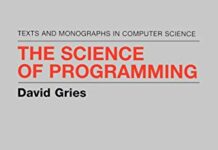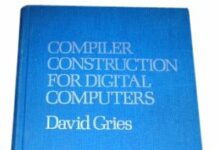
Ebook Info
- Published: 1993
- Number of pages: 532 pages
- Format: PDF
- File Size: 40.88 MB
- Authors: David Gries
Description
Here, the authors strive to change the way logic and discrete math are taught in computer science and mathematics: while many books treat logic simply as another topic of study, this one is unique in its willingness to go one step further. The book traets logic as a basic tool which may be applied in essentially every other area.
User’s Reviews
Editorial Reviews: Review “This is a rather extraordinary book, and deserves to be read by everyone involved in computer science and – perhaps more importantly – software engineering. I recommend it highly… If the book is taken seriously, the rigor that it unfolds and the clarity of its concepts could have a significant impact on the way in which software is conceived and developed.” – Peter G. Neumann
Reviews from Amazon users which were colected at the time this book was published on the website:
⭐David Gries’s book is great at showing the connection between logic and Discrete Math. This approach can be a little cumbersome if one wants to learn graphs, trees, integer algorithms, etc., and yet you do not want to deal with a complex logical framework, but are willing to work with a more intuitive notion of proof.The book has one of the best discussions of Boolean logic I’ve read. It is especially strong in discussing various “duals” that make it easy to derive theorems.This book is for a reader who wants to learn mathematical logic, from scratch, and who wants to learn an approach to Discrete Mathematics that emphasizes logic.For many people this will be a great second book on Discrete Mathematics or as a supplementary book. Because of the heavy emphasis on formal proof I’m not sure it would make a great book to start from.I give it five stars since it is a five star book so far as its intentions are concerned.
⭐I took a math class with Rodrigo Cardozo, based on this book and it really taught me how to use propositional calculus while applying it to computer programming.It has only a few examples on how to prove the theorems for each chapter, yet if you take the time to develop a proof for each theorem yourself -as I have done-, you will end up with a very solid knowledge of logic and a structured idea of how to approach math and use it to write perfect programs from the start.It is a challenging task. I enjoyed it.
⭐Just the book I needes for “Foundations of Comp Sci” class. It waw brand new, no marks anywhere and 20 bucks cheaper than the bookstore at the U.
⭐Covers essential subjects for functional language programming.
⭐good book
⭐I used it on my courses of “Logica Simbolica” and “Discretas” at Simon Bolivar University. It is great for practising exercises and demonstrating theorems (at the end of each chapter). It shows great examples to explain its content. It is a must-have for Computer Engineers
⭐Purchased in behalf of a young friend for his university studies. He mentioned that it has proven extremely useful. Worth the price!
⭐great
⭐An older text book, but one that has enabled self-study with a focus on an area I feel I am strongest when it comes to learning maths, and fortunately the book sticks to this area when exploring others. That is, the authors achieve an introduction to topics of discrete maths while keeping the focus on the use of logic to deduce proofs and theories from the axioms of that subject.This was a book I purchased for self-study after looking around and while it is not particularly popular and may not be ideal for some, I’ve enjoyed working through it and have found that the authors take a rather unique approach to the topics covered, but provide additional insight into why they choose to do so.The author’s notes for developing a course with the book, as well as solutions, can be found on Springer’s website for verified course instructors (or those wishing to undertake self-learning).
⭐This has to be the best elementary discrete math textbook I’ve ever had the pleasure of reading. Most introductory texts on discrete math cover the same set of principles, but this one does so in a graceful, concise and readable manner. That isn’t to say it is short of formal notation either – quite the opposite. If you do not use this text in an undergraduate course and did not previously buy a text, then I suggest getting a copy of this one to hold onto as your reference copy. It will serve a lot better as reference than say the much larger Rosen text.
Keywords
Free Download A Logical Approach to Discrete Math (Texts and Monographs in Computer Science) in PDF format
A Logical Approach to Discrete Math (Texts and Monographs in Computer Science) PDF Free Download
Download A Logical Approach to Discrete Math (Texts and Monographs in Computer Science) 1993 PDF Free
A Logical Approach to Discrete Math (Texts and Monographs in Computer Science) 1993 PDF Free Download
Download A Logical Approach to Discrete Math (Texts and Monographs in Computer Science) PDF
Free Download Ebook A Logical Approach to Discrete Math (Texts and Monographs in Computer Science)

